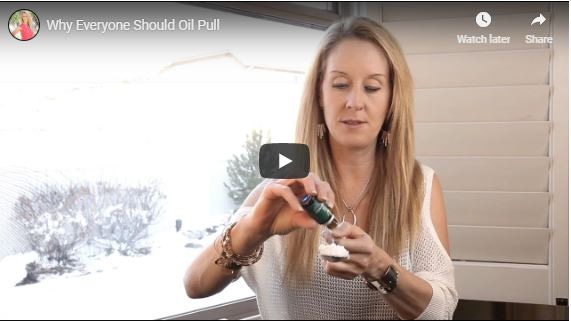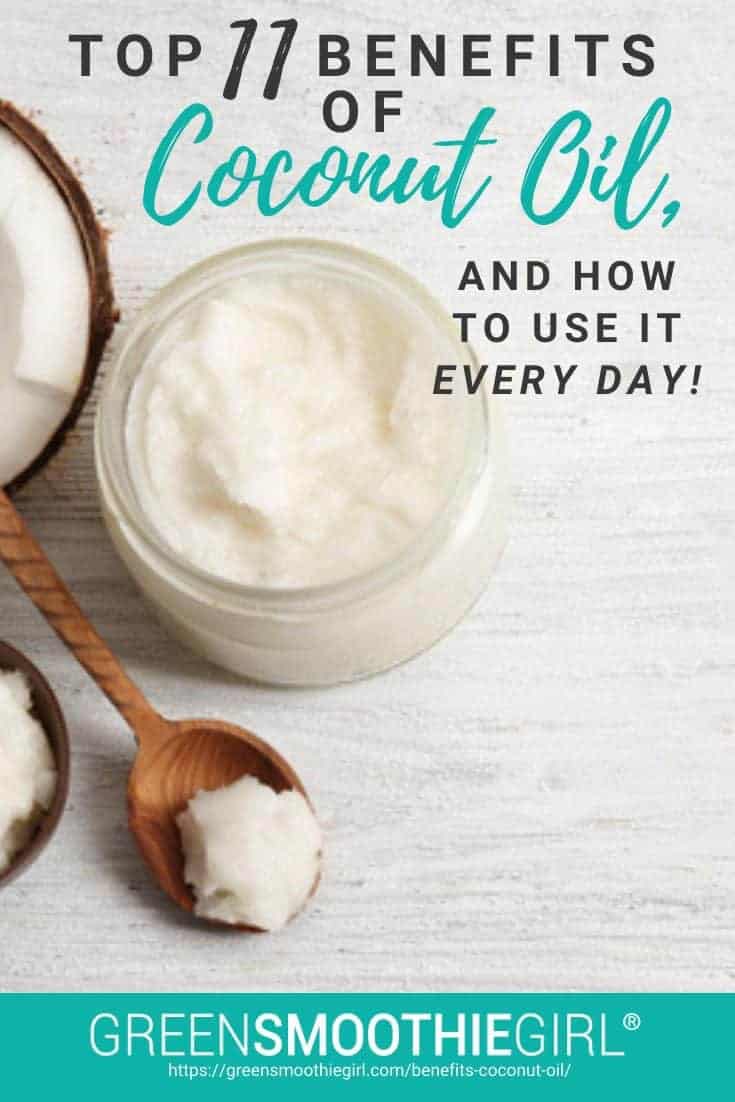Top 11 Benefits of Coconut Oil, And How To Use It Every Day
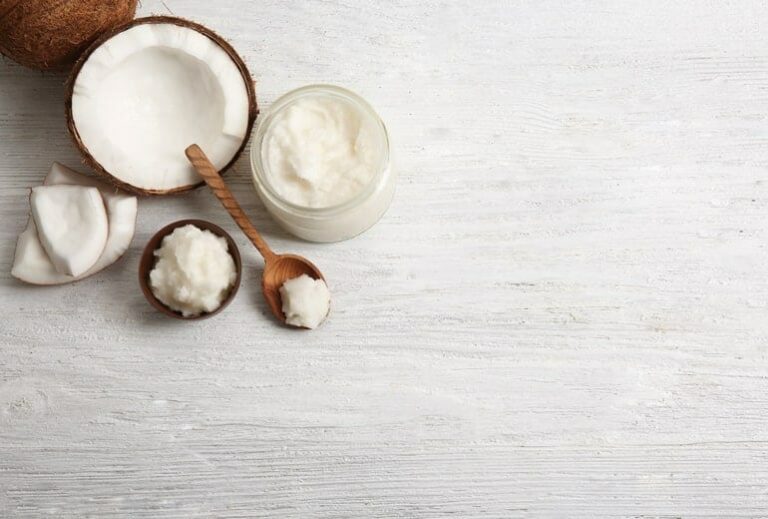
Coconut oil is one of my household staples, and for good reason: this amazing food is far more than just a food! There is a vast amount of data on the ways coconut oil benefits your health, and there are endless ways to use it, including for your skin!
In this article:
- Benefits of Coconut Oil
- What Kind of Coconut Oil is Best?
- What About Saturated Fat in Coconut Oil?
- How To Use Coconut Oil
- Favorite Coconut Oil Recipes
Benefits of Coconut Oil
I could list hundreds of reasons that coconut oil is a great replacement for “bad fats” in your diet and provide important nutrients, but in general, they all boil down to these top 11 coconut oil benefits:
- Provides MCTs: Coconut oil is 64% medium-chain triglycerides (MCTs), which quickly burn as energy rather than storing in the body as fat (especially belly fat) like the long-chains. MCTs are quite rare in foods and have massive positive implications for your health. They help with digestion and provide clean fuel for the body. They help balance hormones, including the ones that control your appetite. By speeding up metabolism, MCTs can also help with weight management.
- Increases efficiency of EFAs: Much has been written about the importance of essential fatty acids (EFAs) in the diet; your body cannot manufacture EFAs itself and therefore must receive them from food. Although coconut oil itself isn’t a significant source of EFAs, its properties can increase the efficiency of EFAs by as much as 100 percent!
- Fights bacteria, viruses, and fungi: Coconut oil is antibacterial, antiviral, and antifungal. On more than one occasion, I’ve helped one of my kids quickly get rid of a fungal infection with simple topical application of this powerful oil.
- Soothes digestion: Coconut oil is easy on the gut because the body doesn’t have to use pancreatic enzymes or bile to digest it. When people start drinking green smoothies or make other nutrition-increasing shifts in their diets, the high fiber can sometimes cause digestive disturbances at first. Adding coconut oil to your meal can help alleviate those symptoms.
- Makes the most of minerals: Good fats like the ones in coconut oil can increase absorption of minerals found in greens (in your salad or smoothie).
- Helps diabetes: Since coconut oil doesn’t affect blood sugar or insulin levels, it can be ideal for those with diabetes. It’s been shown to improve insulin secretion and utilization of blood glucose.
- Resists arterial clogging: Unlike some trans fats and animal products high in fat, coconut oil purifies the blood and is highly alkaline. It doesn’t clog arteries, as it’s liquid above 76 degrees.
- Stays stable for years: Coconut oil is good for 3 years or more, even when stored at room temperature. Compare this to refined oils, like vegetable oil or canola oil, which are already rancid when you buy them.
- Supplies lauric acid: Another rare feature of coconut oil is that its main component is lauric acid, the powerful antimicrobial, immune-function compound found in breast milk. That’s why baby formula companies use it for fatty acids in formula—it’s the closest they can get to mother’s milk. (Unfortunately, they use an inexpensive processed version of the oil, so the quality leaves a lot to be desired.)
- Remains healthy when heated: Coconut is the only oil that doesn’t create trans fats even when heated to high temps, so it’s perfect for cooking. (Chapter 4 of 12 Steps to Whole Foods has wonderful recipes using coconut oil.)
- Fights cravings: Many people use coconut oil to help them control sugar cravings, a huge benefit for those making big changes to their diets.
What Kind of Coconut Oil is Best?
Not all coconut oils are created equal. My recommendation is to look for the words “organic,” “virgin,” and “unrefined.” These designations tell you you’re getting the best flavor and highest retention of antioxidants.
The words “virgin” and “unrefined” are interchangeable in this case; either way, it means that the product is kept at a low heat during the pressing/extracting process and made from fresh coconut as opposed to dried copra (coconut kernels).

The best coconut oil for all health benefits is organic and unrefined.
What About Saturated Fat in Coconut Oil?
Some people stay away from coconut oil on principle, thinking that since it’s technically a “saturated fat,” it’s no good. This misconception is promoted by a years-long smear campaign, courtesy of the emerging vegetable oil industry, that effectively removed tropical oils from the shelves. They lumped this unprocessed, high-nutrition oil in with partially hydrogenated oils that are truly harmful.
The type of fat in coconut oil, the medium-chain triglycerides (MCT) discussed above, affects cholesterol very differently than other saturated fats. Yes, it can raise LDL (the bad cholesterol), but it actually improves its quality, and also raises HDL (the good cholesterol). In the end, it improves the ratio of LDL to HDL, which is the most important cholesterol-related indicator of heart and vascular health.

Coconut oil improves the quality of the bad cholesterol, and raises the good!
This isn’t to say that you can’t eat too much coconut oil; it is high in calories, after all, so a small but consistent amount in your diet is optimal. But this healthy fat is far superior to the fats you’ll find in vegetable and other oils.
How To Use Coconut Oil
Like its benefits, the uses for coconut oil are many and profound. Here are my favorite ways to use it:
Skin Care
Coconut oil is my favorite thing to use on any kind of skin problem or injury. When I had an unfortunate run-in with the sidewalk several years ago and had cuts and scrapes all over my face, coconut oil came to the rescue! I applied it daily and am relieved to say that the injuries healed wonderfully and didn’t scar.
You can also use coconut oil as an all-purpose moisturizer. It works all over the body and keeps the skin hydrated, nourished, and fresh-looking. We spend so much money on serums and lotions that are full of refined oils and chemicals, but coconut oil has them all beat, and it’s so inexpensive!
The best part is that coconut oil soaks into the skin and benefits the body nutritionally just as if you’d eaten it. In fact, I put so much of it on topically that I don’t always concern myself with getting it into my food; the benefit is still there.
Hair Care
You can use coconut oil as a conditioner, a detangler, a hair serum, and a scalp treatment to fight dandruff and stimulate hair growth. It also offers protection from sun damage! I have a lot of long hair and count on coconut oil to keep it healthy.

Coconut oil helps your scalp stay hydrated and free from dandruff, among other benefits.
My favorite technique is to rub handfuls of coconut oil into my hair before I shower; I’ll sometimes leave it in overnight, putting a stocking cap on to protect my sheets, and then wash it out the next morning. My hair is always wonderfully silky and soft afterwards.
Baking
Try using organic, unrefined coconut oil as a substitute for butter, margarine, shortening, or vegetable oil in any baking recipe. Usually a 1:1 ratio is perfect for the oil or fat you are substituting for.
Measure it in a solid form if you’re replacing a solid (like butter or shortening) and in a liquid form if you’re replacing a liquid (like vegetable oil or melted butter). If your coconut oil is solid and you want it to melt, just put your bucket or bottle of oil into a sink half-full of hot water.
Depending on the other ingredients, you might notice a slight coconut taste, but the health benefits are impressive and well worth any minimal change in flavor. Try it out for yourself with the delicious chocolate birthday cake recipe I raised my kids on!
Sauteing
Coconut oil is the perfect sauteing medium because, unlike other oils, it doesn’t create trans fats at high heats. I love it for sauteing vegetables; it works really well with garlic, onion, and plenty of delicious spices.
Frying
You can use coconut oil in any recipe that calls for frying; the coconut flavor diminishes as it heats up, so the taste of your food should be practically unaffected. And if you’re looking to deep-fry, coconut oil is definitely the healthiest oil you can use.
Homemade Deodorant
Coconut oil works well as a natural alternative to commercial deodorants. Try combining it with baking soda and a pure essential oil like lavender, wild orange, or peppermint. Then, just rub it on with your fingertips.
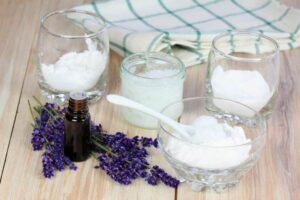
Coconut oil deodorant doesn't have the added pore-clogging aluminum and smells just as good (or better!)
Oil Pulling
Any article about the benefits of coconut oil would be lacking if it didn’t mention oil pulling. This powerful Ayurvedic tradition is a simple habit, but it’s an incredible detoxifier and contributor to overall health.
Here’s how to try it for yourself: Take a large spoonful of coconut oil in your mouth, preferably first thing in the morning. Swish it around for up to 20 minutes without swallowing or spitting. When you’re done, spit it out in the garbage can (not down the drain) and rinse with water. The coconut oil attracts and traps toxins, freshens breath, gradually whitens teeth, and kills harmful microorganisms in the mouth. Many dentists and doctors (including mine) recommend it for re-mineralizing bone in the teeth, which helps fight tooth decay.
Check out my video demonstrating oil pulling!
Favorite Coconut Oil Recipes
I’ve got two quick recipes to share with you, two of my favorite ways to eat coconut oil:
- GreenSmoothieGirl’s “Almond Joy” Fudge: Put 2 cups each organic, raw agave nectar (found in health food stores) and coconut oil in your turbo blender. Set the blender jar in a sink of hot water for 10 minutes to warm the oil so it can blend easily. Add 1 cup powdered raw chocolate (or unsweetened cocoa) and blend well. Pour into a 9x13 pan and stir in 2 cups each of shredded coconut and chopped or sliced almonds. Chill for several hours, then cut into squares. Easy to freeze for a daily chocolate fix that also supplies your coconut oil!
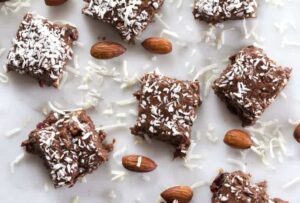
The unsweetened coconut flakes are the finishing touch in my yummy almond joy fudge.
- Kettle Corn: Liquefy ⅓ cup coconut oil and ⅓ cup agave nectar together, double-boiler style, by putting them in a heavy bowl or jar and submerging them in hot tap water. In a large bowl or brown paper bag, pour the mixture over 3 batches of air-popped organic popcorn. Sprinkle with 2 teaspoons Original Himalayan Crystal Salt, then stir or shake well.
I hope you’ll make coconut oil a regular part of your diet and personal care. Once you have it on hand, you’ll find yourself using it all the time — and feeling and looking better as a result.
Read next: Surprising (And Proven) Uses and Benefits of Castor Oil

Disclosure: This post may contain affiliate links that help support the GSG mission without costing you extra. I recommend only companies and products that I use myself.
Posted in: 12 Steps To Whole Food, Natural Remedies, Recipes, Whole Food



